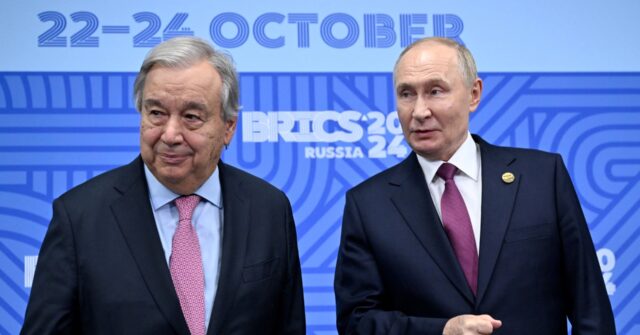The recent BRICS summit in Kazan featured a notable appearance by United Nations Secretary-General Antonio Guterres, who engaged in a one-on-one meeting with Russian President Vladimir Putin. This meeting marked a significant diplomatic moment for Putin, as he sought to counter perceptions of Russian isolation following the ongoing conflict in Ukraine, which escalated dramatically in February 2022. Russia’s invasion, framed by the Kremlin as a “special operation” to remove Ukraine’s leadership, has faced international condemnation, particularly given the tragic backdrop of the conflict involving President Volodymyr Zelensky, who is of Jewish descent. The Ukrainian government expressed outrage over Guterres’s participation in the BRICS summit, feeling that it undermined Ukraine’s efforts for legitimate peace and dialogue.
Zelensky’s administration was particularly critical of Guterres’s attendance at the summit, contrasting it with his absence from a Ukrainian-organized peace summit earlier in June. The Ukrainian Foreign Ministry’s statement underscored this discontent, indicating that Guterres’s choice to align with the BRICS platform—a coalition perceived as anti-Western—was misguided and did not contribute to the peace process. While Guterres attempted to convey messages about peace during his address at the summit, he refrained from directly placing blame on Russia for its ongoing aggression in Ukraine, which further disappointed Ukrainian officials.
The BRICS alliance, comprised of Brazil, Russia, India, China, and South Africa, aims to amplify the voices of underrepresented nations but often engages in efforts that challenge the established Western order. The recent addition of Iran, the UAE, Ethiopia, and Egypt to the BRICS bloc signifies a strategic expansion, further positioning the coalition against American interests internationally. Critics argue that this alliance tends to prioritize opposing global structures built after World War II, often at the expense of human rights and democratic values, thus complicating the landscape of international cooperation.
During his meeting with Putin, Guterres reiterated that the Russian invasion violated United Nations principles, although this stance did not translate into a robust condemnation in his public statements. Instead, Guterres highlighted the necessity for global peace and security, voicing concerns over conflicts not limited to Ukraine, such as the ongoing violence in Gaza and Sudan. His messages echoed the need for humanitarian assistance and respect for international law, though specific demands regarding Russia’s actions in Ukraine remained muted. This approach has drawn mixed reactions, particularly from Kyiv, which emphasized that the UN must maintain accountability in its dealings with aggressors like Russia.
The Ukrainian Foreign Ministry’s response to Guterres’s actions was pointed, reflecting national sentiment regarding the UN’s role in the conflict. By attending the summit hosted by what Kyiv deems a war criminal, Guterres risked compromising the integrity and effectiveness of the United Nations itself. This discontent was further amplified by Zelensky’s critical remarks, where he implied that collaborative efforts among nations committed to human rights and democratic values are the true defenders of the principles that the UN is meant to uphold.
Following these events, Zelensky was noncommittal about extending a welcome to Guterres if he sought to visit Ukraine. This reaction highlighted a rift not only in perspectives on international diplomacy but also on how effective peace processes can be organized. In the face of ongoing military actions against Ukraine—including potential support from alliances like North Korea—the president underscored the importance of collective action rooted in shared human values rather than political maneuvering. The unfolding dynamics encapsulated in the summit illustrate the greater geopolitical tensions at play and the challenges confronting global institutions like the United Nations in mediating complex conflicts.

